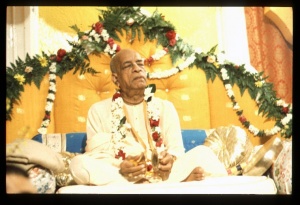CC Adi 7.117: Difference between revisions
m (1 revision(s)) |
No edit summary |
||
| Line 1: | Line 1: | ||
{{ | [[Category:Sri Caitanya-caritamrta - Adi-lila Chapter 07|C117]] | ||
<div style="float:left">'''[[Sri Caitanya-caritamrta|Śrī Caitanya-caritāmṛta]] - [[CC Adi|Ādi-līlā]] - [[CC Adi 7|Chapter 7: Lord Caitanya in Five Features]]'''</div> | |||
<div style="float:right">[[File:Go-previous.png|link=CC Adi 7.116|Ādi-līlā 7.116]] '''[[CC Adi 7.116|Ādi-līlā 7.116]] - [[CC Adi 7.118|Ādi-līlā 7.118]]''' [[File:Go-next.png|link=CC Adi 7.118|Ādi-līlā 7.118]]</div> | |||
{{CompareVersions|CC|Adi 7.117|CC 1975|CC 1996}} | |||
{{RandomImage}} | |||
==== TEXT 117 ==== | ==== TEXT 117 ==== | ||
<div | <div class="verse"> | ||
jīva-tattva—śakti, kṛṣṇa-tattva—śaktimān | :jīva-tattva—śakti, kṛṣṇa-tattva—śaktimān | ||
gītā-viṣṇupurāṇādi tāhāte pramāṇa | :gītā-viṣṇupurāṇādi tāhāte pramāṇa | ||
</div> | </div> | ||
| Line 12: | Line 16: | ||
==== SYNONYMS ==== | ==== SYNONYMS ==== | ||
<div | <div class="synonyms"> | ||
jīva- | ''jīva-tattva''—the truth of the living entities; ''śakti''—energy; ''kṛṣṇa-tattva''—the truth of the Supreme Personality of Godhead; ''śakti-mān''—the possessor of the energies; ''gītā''—the ''Bhagavad-gītā''; ''viṣṇu-purāṇa-ādi''—''Viṣṇu Purāṇa'' and other ''Purāṇas''; ''tāhāte''—in them; ''pramāṇa''—there are evidences. | ||
</div> | </div> | ||
| Line 19: | Line 23: | ||
==== TRANSLATION ==== | ==== TRANSLATION ==== | ||
<div | <div class="translation"> | ||
“The living entities are energies, not the energetic. The energetic is Kṛṣṇa. This is very vividly described in the Bhagavad-gītā, the Viṣṇu Purāṇa and other Vedic literatures. | “The living entities are energies, not the energetic. The energetic is Kṛṣṇa. This is very vividly described in the Bhagavad-gītā, the Viṣṇu Purāṇa and other Vedic literatures. | ||
</div> | </div> | ||
| Line 26: | Line 30: | ||
==== PURPORT ==== | ==== PURPORT ==== | ||
<div | <div class="purport"> | ||
As already explained, there are three prasthānas on the path of advancement in spiritual knowledge—namely, nyāya-prasthāna (Vedānta philosophy), śruti-prasthāna (the Upaniṣads and Vedic mantras) and smṛti-prasthāna (the Bhagavad-gītā, Mahābhārata, Purāṇas, etc.). Unfortunately, Māyāvādī philosophers do not accept the smṛti-prasthāna. Smṛti refers to the conclusions drawn from the Vedic evidence. Sometimes Māyāvādī philosophers do not accept the authority of the Bhagavad-gītā and the Purāṇas, and this is called ardha-kukkuṭī-nyāya, “the logic of half a hen” (See Adi-līlā 5.176). If one believes in the Vedic literatures, one must accept all the Vedic literatures recognized by the great ācāryas, but the Māyāvādī philosophers accept only the nyāya-prasthāna and śruti-prasthāna, rejecting the smṛti-prasthāna. Here, however, Śrī Caitanya Mahāprabhu cites evidence from the Gītā, Viṣṇu Purāṇa, etc., which are smṛti-prasthāna. No one can avoid the Personality of Godhead in the statements of the Bhagavad-gītā and other Vedic literatures such as the Mahābhārata and the Purāṇas. Lord Caitanya therefore quotes a passage from the Bhagavad-gītā ([[BG 7.5]]). | As already explained, there are three ''prasthānas'' on the path of advancement in spiritual knowledge—namely, ''nyāya-prasthāna'' (Vedānta philosophy), ''śruti-prasthāna'' (the ''Upaniṣads'' and Vedic ''mantras'') and ''smṛti-prasthāna'' (the ''[[Bhagavad-gita As It Is (1972)|''Bhagavad-gītā'']]'', ''Mahābhārata'', ''Purāṇas'', etc.). Unfortunately, Māyāvādī philosophers do not accept the ''smṛti-prasthāna. Smṛti'' refers to the conclusions drawn from the Vedic evidence. Sometimes Māyāvādī philosophers do not accept the authority of the [[Bhagavad-gita As It Is (1972)|''Bhagavad-gītā'']] and the ''Purāṇas'', and this is called ''ardha-kukkuṭī-nyāya'', “the logic of half a hen” (See ''Adi-līlā'' 5.176). If one believes in the Vedic literatures, one must accept all the Vedic literatures recognized by the great ''ācāryas'', but the Māyāvādī philosophers accept only the ''nyāya-prasthāna'' and ''śruti-prasthāna'', rejecting the ''smṛti-prasthāna''. Here, however, Śrī Caitanya Mahāprabhu cites evidence from the ''Gītā'', ''Viṣṇu Purāṇa'', etc., which are ''smṛti-prasthāna''. No one can avoid the Personality of Godhead in the statements of the [[Bhagavad-gita As It Is (1972)|''Bhagavad-gītā'']] and other Vedic literatures such as the ''Mahābhārata'' and the ''Purāṇas''. Lord Caitanya therefore quotes a passage from the [[Bhagavad-gita As It Is (1972)|''Bhagavad-gītā'']] ([[BG 7.5 (1972)|BG 7.5]]). | ||
</div> | </div> | ||
__NOTOC__ | |||
<div style="float:right; clear:both;">[[File:Go-previous.png|link=CC Adi 7.116|Ādi-līlā 7.116]] '''[[CC Adi 7.116|Ādi-līlā 7.116]] - [[CC Adi 7.118|Ādi-līlā 7.118]]''' [[File:Go-next.png|link=CC Adi 7.118|Ādi-līlā 7.118]]</div> | |||
__NOTOC__ | |||
__NOEDITSECTION__ | |||
Revision as of 04:35, 12 July 2021

A.C. Bhaktivedanta Swami Prabhupada
TEXT 117
- jīva-tattva—śakti, kṛṣṇa-tattva—śaktimān
- gītā-viṣṇupurāṇādi tāhāte pramāṇa
SYNONYMS
jīva-tattva—the truth of the living entities; śakti—energy; kṛṣṇa-tattva—the truth of the Supreme Personality of Godhead; śakti-mān—the possessor of the energies; gītā—the Bhagavad-gītā; viṣṇu-purāṇa-ādi—Viṣṇu Purāṇa and other Purāṇas; tāhāte—in them; pramāṇa—there are evidences.
TRANSLATION
“The living entities are energies, not the energetic. The energetic is Kṛṣṇa. This is very vividly described in the Bhagavad-gītā, the Viṣṇu Purāṇa and other Vedic literatures.
PURPORT
As already explained, there are three prasthānas on the path of advancement in spiritual knowledge—namely, nyāya-prasthāna (Vedānta philosophy), śruti-prasthāna (the Upaniṣads and Vedic mantras) and smṛti-prasthāna (the Bhagavad-gītā, Mahābhārata, Purāṇas, etc.). Unfortunately, Māyāvādī philosophers do not accept the smṛti-prasthāna. Smṛti refers to the conclusions drawn from the Vedic evidence. Sometimes Māyāvādī philosophers do not accept the authority of the Bhagavad-gītā and the Purāṇas, and this is called ardha-kukkuṭī-nyāya, “the logic of half a hen” (See Adi-līlā 5.176). If one believes in the Vedic literatures, one must accept all the Vedic literatures recognized by the great ācāryas, but the Māyāvādī philosophers accept only the nyāya-prasthāna and śruti-prasthāna, rejecting the smṛti-prasthāna. Here, however, Śrī Caitanya Mahāprabhu cites evidence from the Gītā, Viṣṇu Purāṇa, etc., which are smṛti-prasthāna. No one can avoid the Personality of Godhead in the statements of the Bhagavad-gītā and other Vedic literatures such as the Mahābhārata and the Purāṇas. Lord Caitanya therefore quotes a passage from the Bhagavad-gītā (BG 7.5).